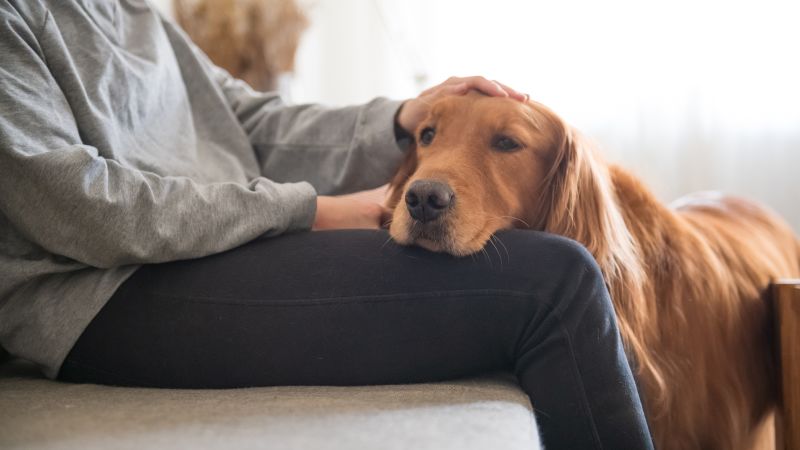
Editor’s Note: Sign up for CNN’s Stress, But Less newsletter. Our six-part mindfulness guide will inform and inspire you to reduce stress while learning how to harness it.
When a family arrived at Koch Funeral Home in State College, Pennsylvania, to identify a loved one before cremation, Monroe took note — staying back to maintain the people’s privacy but ready to offer comfort if asked.
Monroe isn’t a grief counselor or therapist. She’s an Australian Shepherd and resident therapy dog at the funeral home, said Jackie Naginey Hook, a celebrant and end-of-life doula there.
“She has this affinity toward people who might be experiencing grief,” Hook said. “She is drawn to them.”
Sure enough, when members of the family came out, they saw Monroe and asked to say hello, Hook said. Petting her opened them up to telling others about their loss.
Some research has suggested that dogs — whether trained therapy and service animals or just friends in our homes — have a positive impact on human lives, said Colleen Dell, the research chair in One Health and Wellness and professor at the University of Saskatchewan.
Just 10 minutes spent with a dog helped reduce patients’ pain, according to a March study for which Dell served as lead author.
People often don’t talk about what they’re going through when grieving, Hook said. The process of mourning is as unique to a person as a fingerprint, and many don’t know how to be there for others who are going through it, she added.
For many people, dogs can offer intuitive, unconditional and loving support in times of grief, Dell said.
“We don’t give them the credit that’s due,” Dell said of the animals that provide needed support. “We don’t understand them to the extent that we should. When you start to pull it apart, there’s just so much going on there.”
Love, cuddles and playtime
There are nuances to what people need when mourning a loved one, but generally family and friends should be present, offer hugs and listen without saying too much, Hook said.
It sounds like a perfect job for a dog.
“Healthy healing is really about giving yourself permission to feel what you’re feeling,” Hook said. “Our bodies know how to heal from a cut, and we know how to deal with this, too.”
Luckily for us, dogs don’t judge or have expectations, Dell said.
If someone has developed a strong bond and relationship with a dog, the animal is often able to intuit the emotions of those it loves, Dell said. It can mean the dog knows when to offer a gentle cuddle, she said.
“When we lose a significant other … so many people say that coming home at the end of the day, coming home to an empty house is just hard,” Hook said. “Having a dog there to greet you can make a difference.”
Or a dog can bring a little distraction with a bid for a game of fetch or a walk outside.
“Getting up and going on a walk when you are grieving is incredibly difficult,” Dell said. “They are really good at living in the moment. That takes us away from thinking in the past or even too much in the future.
“They want to go on a walk now; they want to play now.”
What to think about before adopting
When grieving and considering a dog, it’s important to think about how the animal would fit into your life and vice versa, Dell said.
“The relationship we have with an animal is different than that which we have with a human,” Dell said. There are more benefits in some ways but also more drawbacks, she added.
It’s a win-win situation when a dog can provide support and the owner can give the proper amount of care and attention, Dell said. But it helps to do your homework to find the right match and be prepared to make a long-term commitment.
Having a dog can sometimes cause extra stress if it is going to be an added strain on time or financial resources to get veterinary care, a sitter for when you are away and training, Dell said.
Dedicating time to learn how to train your dog can help it get the attention it wants and help you get more insight into building a solid bond that benefits you both, she added.
If you are looking for a dog to keep you outside and active, look for a breed with a lot of energy. If you are busy but want a companion, maybe find a canine more inclined toward naps. If you travel, a carry-on size pooch is the way to go, Dell said.
Often people grieving may find their patience lower — in which case consider a dog two years or older to avoid puppy antics, she added.
Often dogs become available through foster care after the death of an owner, Dell said. “What a beautiful thing that would be,” she said about fostering an animal. “You’d really be helping each other.”
What if it isn’t the right time for a dog?
But there are still ways to get the benefits from a furry friend without taking on any responsibility, Dell said.
A pet belonging to a neighbor or family member can offer cuddles and play, she added. Or you can spend time in parks where dogs play or venues where therapy dogs might visit.
“(Grieving people) need to feel loved,” Dell said. “These dogs (are) able to provide that in ways that have no strings attached.”
Volunteering with a shelter or rescue group can also bring joy, she said. Just spending time caring for dogs or taking them on a walk can make a huge difference, Dell added.
“You’re doing those things that are normal, that you never, ever think will feel normal again,” she said. “But they do.”